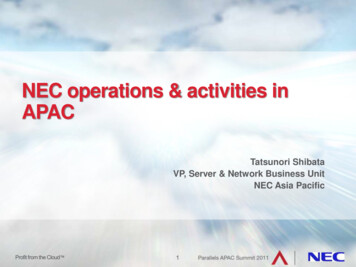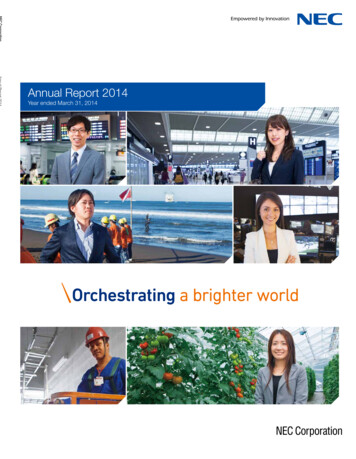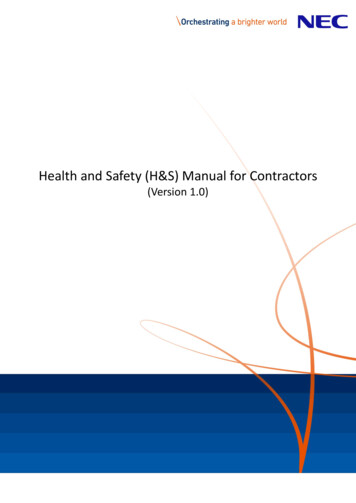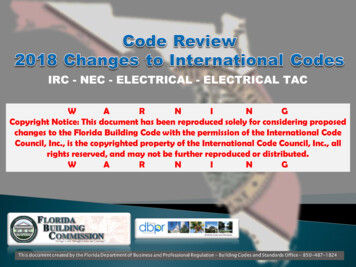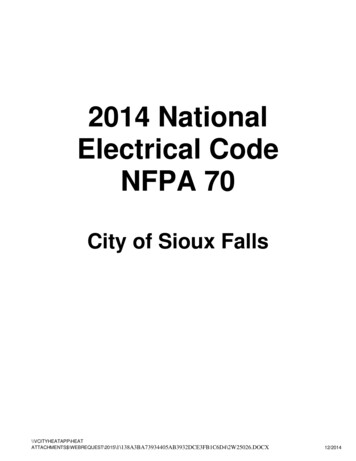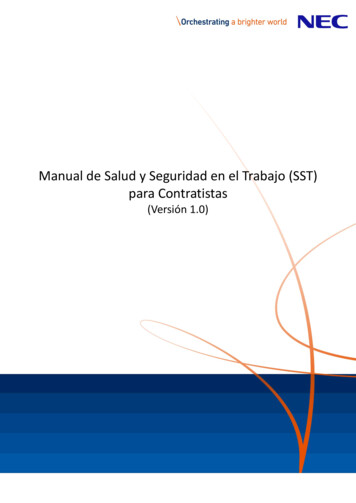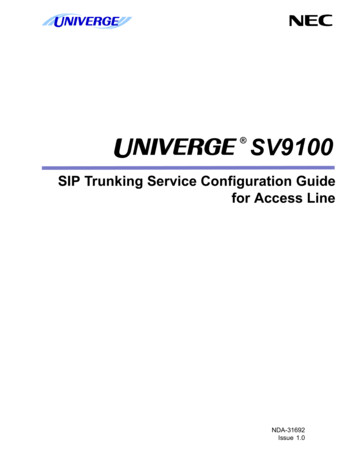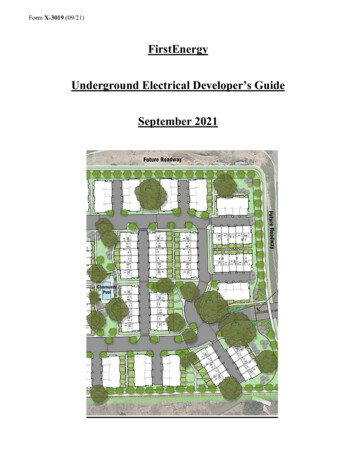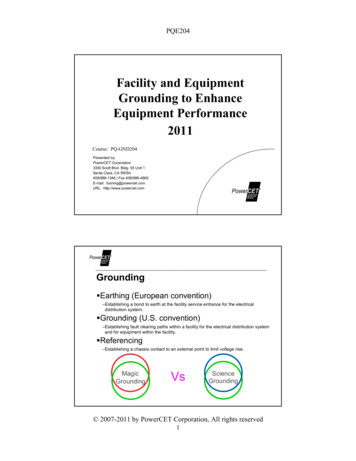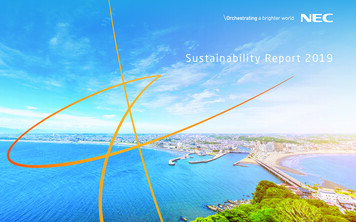
Transcription
Sustainability Report 2019
Table of Contents02 Message from the President45 Promoting Fair Commercial Transactions03 ESG Highlights47 Business Continuity49 Supply Chain ManagementSustainable Management05 Sustainable Management08 Priority Management Themes from anESG Perspective – “Materiality”12 Dialogue Sessions on “Materiality” withExperts16 ESG-Related Objectives, Achievementsand Progress, and Degree of Completion20 Dialogue and Co-creation with OurStakeholdersDialogue with Our DiverseStakeholders – Case Examples22 CS (Customer Satisfaction) Initiative23 Cooperation with the LocalCommunities25 Innovation ManagementEnvironment33 Environmental Management InitiativesGovernance52 Ensuring Quality and Safety54 Information Security and Cyber SecuritySocial58 Respecting Human Rights62 Personal Information Protection andPrivacy65 Human Resources Development andTraining69 Inclusion and Diversity72 Creating a Diverse Work StyleEnvironmentInformation Disclosure PolicyBasic PolicyAiming to be a “Social Value Innovator”, NEC considers communicationwith stakeholders to be a critical initiative because communicationprovides an opportunity for us not only to recognize our obligation tocarry out our social responsibility but also to understand the fundamentalissues of our customers and society. As such, we have positionedcommunication with stakeholders as part of our “materiality”—prioritymanagement themes from an environmental, social, and governance(ESG) perspective.We use our sustainability website and sustainability reports (PDF) astools to enable this communication, disclosing the sustainabilityinitiatives and their results as viewed from ESG. NEC’s integrated reportalso presents the essence of the sustainability reports, mainly with afocus on “materiality,” as well as the essence of our securities report,which discloses our financial activities.Scope of ReportIn principle, the content relates to NEC Corporation in certain sections,but also includes subsidiary companies and affiliates in other sections.“NEC” refers to NEC Corporation and its subsidiary companies, unlessotherwise noted.Medium-term objectives presented in “ESG-related Objectives,Achievements and Progress, and Degree of Completion” related to ESGare for fiscal 2019-fiscal 2021.Reporting PeriodApril 1, 2018 to March 31, 2019(hereinafter referred to as “Fiscal 2019.” Any other fiscal years would bereferred to similarly.)Disclosure FormatSustainability Website and Sustainability Report (PDF)s74 Health and SafetyNEC regularly discloses the latest information on its sustainabilityactivities via its sustainability website. Furthermore, it emphasizesdetailed coverage of information to ensure conformance withinternational reporting initiatives such as GRI, while addressing theneeds of sustainability professionals such as ESG research institutes, thenews media, universities, and NPOs/NGOs.The sustainability report (English) posted on the sustainabilitywebsite is published each September in PDF format. The previoussustainability report in Japanese was published in September 2018.Appendices and Data CollectionNEC Integrated Report79Data Collection84Third-party Assurance85External Ratings and Evaluation87GRI (Global Reporting Initiative) Index90Global Compact Index91ISO26000 Index40 Corporate GovernanceNEC Integrated Report explains our management strategies, which areaimed at promoting the sustainable growth of NEC and society as a whole,from both financial and non-financial perspectives. NEC has publishedintegrated annual reports containing both financial and non-financialinformation since fiscal 2014. In July 2018, NEC changed the name of thereport to the “Integrated Report,” having defined its materiality.Reference GuidelinesWith the aim of achieving conformance with international reportinginitiatives, NEC reports on its sustainability activities with reference tothe following guidelines:- GRI’s Sustainability Reporting Guidelines Standard- United Nations Global Compact- ISO 26000In addition to the above, NEC also refers to the Sustainability AccountingStandards of the Sustainability Accounting Standards Board (SASB).NEC is a signatory to theUnited Nations Global Compact.41 Compliance and Risk Management44 Basic Approach to Tax Matters1
NECSustainability Report2019Message from the PresidentInitiating desirable change for society and the environment in our 120th year by offering products andservices that promote safety, security, efficiency, and equalitySince its establishment in 1899, NEC has contributed to customers and society by consistently providing products and services centered on IT and networks under themotto of “Better Products, Better Services.” In 2014, we created the Brand Statement “Orchestrating a brighter world” and have since then promoted businessactivities that originate from our desire to address important social issues through the utilization of our ICT assets and co-creation with our stakeholders.In 2019, under the Mid-term Management Plan 2020, NEC identified its priority management themes from an environmental, social, and governance (ESG)perspective, or “Materiality,” and pursued the following activities, aiming to become a company that will continue to contribute to society for the next 100 years.Environmental PerspectiveTo integrate environmental initiatives related to climate change and other issues into our management decisions, NEC expressed its support for the Task Force onClimate-related Financial Disclosures (TCFD) in July 2018. Aiming for zero CO 2 emissions from our own business activities in fiscal 2050, NEC’s environmentalpromotion and business divisions have united to analyze risks and opportunities resulting from climate change and are reflecting the results of these analyses in ourbusiness plans.Social PerspectiveNEC is conducting its business activities by placing utmost priority on privacy considerations and other human rights in relation to the application and utilization of AIand biometrics data across all businesses. This approach not only reduces and avoids risks but also improves the reliability of solutions and services offered by theNEC Group. To clearly communicate this principle both internally and externally, NEC released the “NEC Group AI and Human Rights Principles” in April 2019. NECalso actively trains personnel with a high level of social sensitivity to be able to create value that remains socially acceptable amidst the rapidly changing businessenvironment. NEC is endeavoring to transform its corporate culture by not only enhancing the execution capabilities of each and every employee at their respectiveworkplaces but also implementing reforms in its human resource systems, promoting value-added work styles, and setting specific targets for the proportion offemale employees and persons in managerial positions as part of initiatives to promote inclusion and diversity.Governance PerspectiveIn addition to enforcing thorough compliance, NEC is working towards reforming its business execution system, clarifying the decision-making process and role of itsBoard of Directors, and enhancing the sophistication of processes for nomination and compensation of Directors and Board Members.All of these activities are based on the Ten Principles in the four areas of human rights, labor, environment, and anti-corruption of the United Nations Global Compact,a global initiative aimed at facilitating the sustainable growth of society and corporations to which NEC became a signatory in 2005. NEC is also committed tocontributing to the achievement of the Sustainable Development Goals (SDGs) by engaging in dialogue with customers and various other stakeholders while workingtogether with them to promote these activities.This year marks NEC’s 120th anniversary. Looking back over the past 120 years, I am once again reminded that society has experienced extremely intense changesover the past 20 years. Even bigger changes may lie ahead in the next 10 years. To survive in these rapidly changing times, each and every one of us must thinkindependently, act with speed, and endeavor to exhibit change from within ourselves. Likewise, we need to thoroughly consider how we can create systems that enablehumans to live more comfortable and fulfilling lives. As a company in Japan — a pioneer in taking on challenges — NEC is in a unique position to create safe, secure,efficient, and equitable products and services. My vision is for NEC to become a company that initiates desirable change for society and the environment by offeringproducts and services that promote safety, security, efficiency, and equality.July 20192Takashi NiinoPresident and CEO
NECSustainability Report20193
SustainableManagementSustainable Management05-07Priority Management Themes08-11from an ESG Perspective — “Materiality”Dialogue Sessions on “Materiality”with Experts12-15ESG-Related Objectives, Achievements16-19and Progress, and Degree of CompletionDialogue with Our Diverse Stakeholders20-21— Case ExamplesCS (Customer Satisfaction) Initiative22Cooperation with the Local Communities 23-24Innovation Management25-31
NECSustainability ainable ManagementESG-Related Objectives, Achievements and Progress, and Degree of CompletionCooperation with the Local CommunitiesSocial08-1120-2125-31Priority Management Themes from an ESG Perspective – “Materiality”Dialogue with Our Diverse Stakeholders – Case ExamplesInnovation Management12-1522Dialogue Sessions on “Materiality” with ExpertsCS (Customer Satisfaction) InitiativeSustainable ManagementOur Journey in Sustainable ManagementNEC’s story starts in 1899, when the Company was born asJapan’s first joint venture with a foreign company. FounderKunihiko Iwadare created the motto, “Better Products, BetterService,” to express his goal of creating a company thatprovides customers with world-class products and takeresponsibility for them through after-sales service. He aspiredto contribute to solving social issues by providingtelecommunications equipment such as telephones andswitching system.Later, in the 1950s, the Company began working on thedevelopment of computers. In 1977 at the INTELCOM 77international communications expo held in Atlanta, UnitedStates, then-chairman of NEC Koji Kobayashi presented a newconcept, “C&C,” referring to the integration of computer andcommunications technologies.At the time, Chairman Kobayashi articulated the vision of C&Cas follows.Vision for C&CIf I am asked about my vision for communications in thefuture, and if I am allowed to talk beyond my ability, myimagination goes to such extent that social needs forcommunications might be “no talk and see between anypersons, at any time, at any place on the earth, in theearly days of the next Century.”Assuming that this comes true, all technology, communications,computer and television will be, and should be, integratedfor such needs at such time. And, therefore, it is importantto help developing countries to be able to participate insuch a world telecommunications system.This vision has been technologically realized today in our ageof widespread computers, mobile phones, and the internet.The ambition to enable people around the world to be able toconnect anytime, anywhere, and with anyone aligns with theaspiration of the Sustainable Development Goals (SDGs)adopted by 193 United Nations member countries to “leave noone behind.” The issue is now being addressed throughout theworld.5NEC has incorporated this C&C concept into the NEC GroupCorporate Philosophy, formulated in 1990: “NEC strivesthrough ‘C&C’ to help advance societies worldwide towarddeepened mutual understanding and the fulfillment of humanpotential, “and continues to be inspired by this spirit today.As the value expected by customers and society changed fromour tangible technologies and products to the intangiblecreation of value, in 2013 we responded under Mid-termManagement Plan 2015 by declaring our intention totransform into a Social Value Innovator creating “BetterProducts, Better Services” inspired by value to society andsocial issues. The following year, in 2014, we announced ourbrand statement, “Orchestrating a brighter world,” andestablished seven themes for creating social value that NECshould engage with to realize its statement.The seven themes have a strong affinity with the SDGs thatwere announced the following year in 2015. We are makingactive use of these indicators to create business opportunitiesinspired by social issues and to mitigate risks.Initiatives by NEC for Contribution to Achieving the SDGsThe Seven Themes for Social Value Creation
NECSustainability ainable ManagementESG-Related Objectives, Achievements and Progress, and Degree of CompletionCooperation with the Local CommunitiesBasic PolicyFor us at NEC, sustainable management means that every oneof us, executives and employees, will seek to contribute tosolutions for social issues and exert a positive influence onsociety and the environment through our business activitiesand corporate citizenship activities, such as communitycontributions, while listening to the voices of society throughdialogue with our stakeholders.We don't only focus on fulfilling our compliance responsibility,such as ensuring legal compliance and corporate ethics; wealso focus on mitigating corporate risks that may adverselyaffect society or the environment.NEC is therefore promoting sustainable management in linewith the following basic principles.Social08-1120-2125-31Priority Management Themes from an ESG Perspective – “Materiality”Dialogue with Our Diverse Stakeholders – Case ExamplesInnovation ManagementContribute to Solving Social Issues through OurBusiness ActivitiesAs a Social Value Innovator, we confirm the social issues thatwe should address in promoting our business and foster aculture of considering the impacts of our products and serviceson society. We make use of the SDGs when considering thesesocial issues and impacts.For example, in the “Demand and Supply OptimizationPlatform,” which is an initiative in the growth field of “NECValue Chain Innovation,” we are working to provide solutionsfor SDGs Goal 12, Target 12.3 “By 2030, halve per capitaglobal food waste at the retail and consumer levels andreduce food losses along production and supply chains,including post-harvest losses,” as well as other social issues(Targets 7.3, 8.2, 9.1, etc.) that arise from the social issue offood loss. Details of these initiatives are shown in the figurebelow.12-1522Dialogue Sessions on “Materiality” with ExpertsCS (Customer Satisfaction) InitiativePromote Communication with StakeholdersWe believe that continuously operating a PDCA cycle in ourbusiness activities increases not only corporate value, butsocial value as well. Such PDCA cycles rapidly incorporatefeedback from society and use this as a starting point toimprove our initiatives.“Dialogues and co-creation with our stakeholders” is anessential process for understanding the real issues faced bycustomers and society, and their expectations of us, and forbuilding relationships of trust with various stakeholders. Forthis reason, we have positioned it among our “materiality,”identified as priority management themes from an ESGperspective.NEC’s Basic Principles of Sustainable Management1. Strengthen risk management and enforce compliance2. Contribute to solving social issues through our businessactivities3. Promote communication with stakeholdersStrengthen Risk Management and EnforceCompliancePredicated on the concept of “contributing to solving socialissues through our business activities,” NEC places toppriority on “strengthening risk management and enforcingcompliance,” considering not only itself, but also the impacton its customers and society.In 2005, NEC signed the United Nations Global Compact,which calls for corporate activities that adhere to 10principles in the four areas of "Human rights," "Labor,""Environment" and "Anti-corruption," and we periodicallyundertake self-evaluations of the activities as part of ourparticipation.Example of Contribution to Solutions for Social Issues through Business ActivitiesDemand and Supply Optimization Platform6
NECSustainability ainable ManagementESG-Related Objectives, Achievements and Progress, and Degree of CompletionCooperation with the Local CommunitiesPromotion of “Materiality” ― PriorityManagement Themes from an ESGPerspectiveNEC Corporation has connected the social and environmentalinitiatives that it has implemented since its foundation evenmore closer to its business strategies. To link the growth ofsociety to our own, in 2018 with the formulation of Mid-termManagement Plan 2020, we defined our “materiality” aspriority management themes from an ESG perspective. Indefining these themes, we referred to ISO 26000, the GRIStandard, the UN Global Compact, and the SDGs, amongothers, along with holding multiple dialogues with externalexperts in various fields and representative stakeholders. Weorganized these themes as follows, according to thecharacteristics of each item.Social08-1120-2125-31Priority Management Themes from an ESG Perspective – “Materiality”Dialogue with Our Diverse Stakeholders – Case ExamplesInnovation ManagementMeasuring Progress on “Materiality”We have established a vision and indicators for measuringmateriality. The indicators are quantitative as a rule, butwhere a quantitative indicator is difficult to establish, progressis confirmed by showing the background for the target settingand the process for the activities.For example, we measure expansion in market share andother indicators for the two themes under the “2020 GrowthFocus to Create Social Value,” because we believe thatgrowing a business with a strong emphasis on providing socialvalue will bring us closer to realizing our vision.12-1522Dialogue Sessions on “Materiality” with ExpertsCS (Customer Satisfaction) InitiativeGlobal StructureIn EMEA (Europe, Middle East and Africa) and APAC (Asia andthe Pacific), we have established promotors for drivingsustainability initiatives in each region. The SustainabilityPromotion Office, Environmental Management PromotionDepartment, and Purchasing Division coordinate with thepromoter in each region and work to contribute to thesolution of global sustainability issues by sharing informationrelated to sustainability with local overseas subsidiaries andpromoting efforts to address human rights issues.Sustainable Management PromotionFrameworkNEC’s sustainable management is promoted by theSustainability Promotion Office within the CorporateCommunication Division, coordinating with the IR Office of thesame division and working closely with relevant divisions suchas Corporate Strategy, Human Resources and General Affairs,Human Resource Organization Development, Compliance,Management Information Systems, Environment, CustomerService, Quality Assurance, and Procurement, and Laboratories,Business Divisions, and Group Companies. We also undertakeinitiatives in coordination with business partners.Board of DirectorsEach materiality has a person responsible who confirmsprogress through the PDCA cycle of the mid-term managementplan and uses this for management self-evaluation from an ESGperspective, as well as for motivating officers and employeesand fostering their pride in the Company. It is also used toimprove societies’ evaluation of our initiatives.Key matters for promoting sustainable management arediscussed periodically by corporate officers, and mattersapproved by the officer responsible for sustainabilitypromotion are reported and discussed within the Board ofDirectors.For more information about the materiality selectionprocess, please refer to Sustainable Management inSustainability Report 2018Priority Management Themes from an ESG Perspective –“Materiality”7Sustainable management promotion structure
NECSustainability ainable ManagementESG-Related Objectives, Achievements and Progress, and Degree of CompletionCooperation with the Local CommunitiesSocial08-1120-2125-31Priority Management Themes from an ESG Perspective – “Materiality”Dialogue with Our Diverse Stakeholders – Case ExamplesInnovation Management12-1522Dialogue Sessions on “Materiality” with ExpertsCS (Customer Satisfaction) InitiativePriority Management Themes from an ESG Perspective ― “Materiality”Nine Themes for Creating Value andReducing RiskNEC has identified a total of nine priority management themesfrom an ESG (Environment, Social and Governance) perspective,referred to as “materiality,” which are divided into threelayers, with a view to expanding economic value simultaneouslywith social and environmental value.(1) 2020 Growth Focus to Create Social Value (2 themes)Growth areas under Mid-term Management Plan 2020,organized from an ESG perspective(2) Engines of Change (2 themes)Themes that will serve as engines for minimizing risks tosociety, maximizing economic and social value(3) Sustainable Growth Enablers (5 themes)In addition to carrying out Mid-term Management Plan2020, themes that management should engage with overthe long term as a foundation for a Social Value Innovator(1)(2)(3)Initiatives for Achieving the SDGsSince ICT has the potential for responding to a variety ofissues, we believe that we can contribute to all the goalsoutlined in the SDGs, through engaging in discussions andco-creation with customers and stakeholders. We have notspecified particular SDGs for the entire company to address.In utilizing the SDGs, we not only associate the SDGs with ourbusiness activities, but also break down the social issuesbehind our business activities by the SDG target numbers(target numbers provided for each SDG, such as 1.1, 2.3 andso forth). In this way, we are verifying our progress towardsresolving the target issues through our businesses.NEC Safer CitiesAs populations rapidly concentrate in urban areas, new valuesare created through economic growth and the diversificationof life and culture; at the same time, cities also face a widerange of social challenges, such as increasing levels of crimeand terrorism. NEC will contribute to realizing safe, secure,efficient and equal cities where individuals can exhibit theirpotential to the full and live better lives, by utilizing cuttingedge technology such as biometric authentication, AI(artificial intelligence) and the IoT (internet of things).2020 Growth Focus to CreateSocial ValueIn Mid-term Management Plan 2020, we define “NEC SaferCities,” “Formation of a sustainable, smart supply chain,” and“Safe and comfortable connected cars” as growing businesses.From an ESG perspective, these are organized into “NEC SaferCities” and “NEC Value Chain Innovation.”We believe that the social value we provide is increased whenNEC products and services are widely used by customers. Wetherefore use the financial indicators specified in the Mid-termManagement Plan 2020 to measure our progress. On the otherhand, we are also working to quantitatively show what kind ofvalue our products and services provide for society.Non-financial indicators for measuring progress andinitiatives in fiscal 2019We are using our financial indicator of international sales of200 billion yen for fiscal 2021 as a materiality indicator.In fiscal 2019, the business divisions led an examination ofmodel cases in the two areas of public safety and digitalgovernment to determine whether it is possible to quantitativelymeasure the value provided to society by NEC Safer Cities.We will continue to analyze model cases and examine ways toexpress our social value in each business area.8
NECSustainability ainable ManagementESG-Related Objectives, Achievements and Progress, and Degree of CompletionCooperation with the Local CommunitiesNEC Value Chain InnovationOur society faces various kinds of social issues, such as foodwaste, labor shortages, changes in the consumptionenvironment, and diversifying threats.NEC will develop cutting-edge technologies and promote cocreation with customers in order to connect people, goods,and processes, reaching across the boundaries betweenenterprises and industries to create new value. In addition,NEC will support a more sustainable planet, sustainablegrowth for companies, a society where people can live inabundance, and a brighter world for the future.Social08-1120-2125-31Priority Management Themes from an ESG Perspective – “Materiality”Dialogue with Our Diverse Stakeholders – Case ExamplesInnovation ManagementWe will conduct model case analysis for NEC Value ChainInnovation in the same way as for NEC Safer Cities.Engines ofChangeEngines of Change12-1522Dialogue Sessions on “Materiality” with ExpertsCS (Customer Satisfaction) InitiativeWe recognize that dialogues and co-creation of value areprocesses that NEC should incorporate into all businessactivities. For this reason, we do not specify non-financialindicators for this area.Dialogue and co-creation with our stakeholdersDialogue and Co-creation with Our StakeholdersValues are constantly changing for our customers and society.To supply products and services that deliver real value tothem, NEC incorporates processes for dialogue and cocreation with stakeholders into its corporate activities.In Sustainability Report 2019, we report on the followingexamples of dialogue and co-creation.Dialogue with Experts on “Materiality”Example of Dialogue with Diverse Stakeholders- Dialogue with United Nations and InternationalInstitutions- Dialogue with Students- Dialogue with Local Communities, NPOs and NGOs- Dialogue with EmployeesDialogue with NPOs and NGOsDialogue with Shareholders and InvestorsDialogue with CustomersDialogue with SuppliersInnovation ManagementSince NEC was founded, it has cultivated its technologiesbased on NEC's motto of "Better Products, Better Services."In a society that is constantly changing, the technologies indemand keep changing as well; by implementing appropriateinnovation management, we can continue to generate socialvalue in the form of the technologies, products and servicesthat society demands.Non-financial indicators for measuring progress andinitiatives in fiscal 2019NEC aims to amplify the social value it provides by developingand supplying larger numbers of services. For example, wewill contribute to reducing food waste from manufacturing andsupply chains, which is defined in SDGs Goal 12, Target 12.3by promoting NEC Value Chain Innovation which aims tooptimize the demand-and-supply balance.For fiscal 2021, we have set out a goal of expanding ourdomestic sales to 85 billion yen in growth fields including NECValue Chain Innovation.Through dialogue with stakeholders, we will develop insightsinto the issues customers and society face and their opinionsregarding NEC’s activities, while developing partners withwhom to engage in the co-creation of value. By connectingthese activities to co-creation, we aim to realize the worlddescribed by NEC’s aspiration of “Orchestrating a brighterworld.”9NEC is investing approximately 4% of our sales revenues intoR&D in order to realize innovation sustainably. However, forthis theme, we have not set a non-financial indicator tomeasure how much value is generated by innovationmanagement. This is because NEC believes that the outcomesof innovation management in terms of social value creationare, by their nature, things that can only be measured for thefirst time when our technologies successfully deliver value tosociety in the form of products and services.Innovation Management
NECSustainability Report2019Environment05-0716-1923-24Sustainable ManagementESG-Related Objectives, Achievements and Progress, and Degree of CompletionCooperation with the Local CommunitiesSustainable Growth EnablersGovernance and ComplianceSince our establishment in 1899, NEC has pursued itsbusiness activities based on the trust of its customers andsociety. We believe that this trust is developed by everymember of NEC, from executives to employees, with eachmember putting compliance first in order to carry out his/herwork in a sustainable manner, based on an extremely soundand transparent governance framework.In particular, ensuring compliance in areas such as fair tradeand anti-corruption is an essential measure for gaining andmaintaining trust. NEC ensures compliance in cooperationwith the suppliers and partners who are part of our valuechain.Compliance and Risk ManagementSupply Chain ManagementHuman rights issues are another priority for NEC. The NECGroup Human Rights Policy is applied to all NEC members,from executives to employees. If any of our businessactivities within the value chain should have negative effectson the human rights of the stakeholders involved, we makeour best efforts to remedy the situation or cooperate withothers in order to do so, then make further efforts to ensurethat similar incidents do not occur again.Respect for Human RightsFurther, we have provided products and services over manyyears under the motto “Better Products and Better Services,”our original founding spirit, and maintaining and improvingthese continues to be one of our most important managementpriorities.Ensuring Quality and SafetyGovernanceSocial08-1120-2125-31Priority Management Themes from an ESG Perspective – “Materiality”Dialogue with Our Diverse Stakeholders – Case ExamplesInnovation Management12-1522Dialogue Sessions on “Materiality” with ExpertsCS (Customer Satisfaction) InitiativeNon-financial indicators for measuring progress andinitiatives in fiscal 2019Non-financial indicators for measuring progress andinitiatives in fiscal 2019To eliminate violations of compliance, we implement in-housetraining courses to ensure that all our members fromexecutives to employees prioritize compliance in the a
website is published each September in PDF format. The previous sustainability report in Japanese was published in September 2018. NEC Integrated Report. NEC Integrated Report explains our management strategies, which are aimed at promoting the sustainable growth of NEC and society as a whole,
